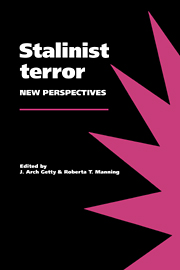Book contents
- Frontmatter
- Contents
- Acknowledgments
- Introduction
- Part I Persons and Politics
- Part II Backgrounds
- Part III Case Studies
- Part IV Impact and Incidence
- 11 Patterns of Repression Among the Soviet Elite in the Late 1930s: A Biographical Approach
- 12 The Impact of the Great Purges on Soviet Elites: A Case Study from Moscow and Leningrad Telephone Directories of the 1930s
- 13 Victims of Stalinism: How Many?
- 14 More Light on the Scale of Repression and Excess Mortality in the Soviet Union in the 1930s
- Index
14 - More Light on the Scale of Repression and Excess Mortality in the Soviet Union in the 1930s
Published online by Cambridge University Press: 07 December 2009
- Frontmatter
- Contents
- Acknowledgments
- Introduction
- Part I Persons and Politics
- Part II Backgrounds
- Part III Case Studies
- Part IV Impact and Incidence
- 11 Patterns of Repression Among the Soviet Elite in the Late 1930s: A Biographical Approach
- 12 The Impact of the Great Purges on Soviet Elites: A Case Study from Moscow and Leningrad Telephone Directories of the 1930s
- 13 Victims of Stalinism: How Many?
- 14 More Light on the Scale of Repression and Excess Mortality in the Soviet Union in the 1930s
- Index
Summary
The academic debate concerning the scale of repression and excess mortality in the USSR during the 1930s has been raging inconclusively for decades. The spread of glasnost' in the USSR has so far done little to dampen the attitudes of the rival contenders in this debate in the West. Both Robert Conquest and myself have repeatedly claimed that the new evidence appearing in the Soviet Union has supported our conflicting claims. Conquest is clearly impressed with the bulk of literary evidence, which does indeed tend to agree with his conclusions; much in fact is based upon his own work. My attitude has always been to try to evaluate the nature of the available evidence, to check its origins and the method of argumentation; in these terms the evidence that has been appearing in the Soviet press has been very mixed.
Although there is a role for literary and propagandist works to force a process of rethinking upon closed minds, there is also a need for serious historical work to produce an unemotional and accurate portrayal of reality. So far we have seen relatively few serious historical works on this subject. Such work will require more than literary creativity; it will need a professional, objective evaluation of evidence which until recently has not been available for examination.
In recent months especially there have been tremendous breakthroughs in the availability of archival material in the Soviet Union, and this new material casts considerably more light on several important aspects of Soviet demography in this period.
- Type
- Chapter
- Information
- Stalinist TerrorNew Perspectives, pp. 275 - 290Publisher: Cambridge University PressPrint publication year: 1993
- 5
- Cited by



